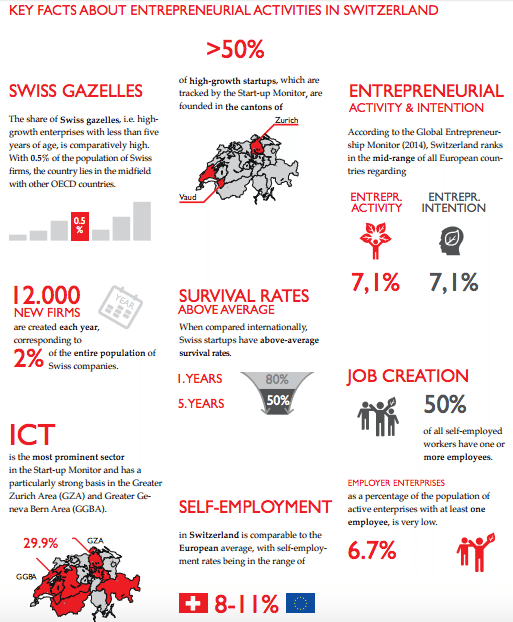While Switzerland might be one of the best locations in the world to set up a business, the country’s own entrepreneurship ecosystem has not yet reached its full potential, according to the Start-up Monitor foundation.
In a new report, the Start-up Monitor foundation provides an in-depth analysis of entrepreneurial activities in Switzerland. Founded in 2012 by ETH Zurich, University and St.Gallen and University of Basel, the Start-up Monitor foundation is an organization aimed at monitoring and helping develop the startup ecosystem in Switzerland.
 The document, entitled ‘The Swiss Entrepreneurship Ecosystem Report 2015/2016,’ addresses the strengths and weaknesses of Switzerland’s entrepreneurial scene and suggests that although the country is one of the most competitive and innovative in the world, there are still many challenges to overcome in order to become an internationally recognized “Start-up Nation.”
The document, entitled ‘The Swiss Entrepreneurship Ecosystem Report 2015/2016,’ addresses the strengths and weaknesses of Switzerland’s entrepreneurial scene and suggests that although the country is one of the most competitive and innovative in the world, there are still many challenges to overcome in order to become an internationally recognized “Start-up Nation.”
Switzerland is globally recognized for its stable, transparent and effective institutions, but also its healthy finances, attractive taxes, excellent infrastructure, exceptional capacity for innovation, and world-class education system, and yet, the country does not rank among the most entrepreneurial countries in the world, the report says.
It notes that due to the lack of growth-stage funding, many startups leave Switzerland at this stage to countries with more favorable conditions. “Switzerland needs to ensure funding opportunities not only for seed-stage, but also for the start-up and growth-stages of a venture,” the report says.
It advises for more entrepreneurship education programs on primary and secondary level, and notes that there is a strong need to strengthen a supportive entrepreneurial culture, notably among young people, in order for them to consider entrepreneurship as a desirable, feasible and viable career opportunity.
The document also claims that there is a strong need to focus on ageing workforces, increasing entrepreneurship intentions to prolong working lives and reduce older-age unemployment.
Moreover, the fact that Switzerland is a relatively small market can cause significant scalability challenges for new ventures.
Swiss Innovation Park Dübendorf
The report lists a number of initiatives that have been undertaken to foster the Swiss entrepreneurial spirit, among which the new innovation center set to launch later this year in Dubendorf. The Swiss Innovation Park is a project of the federal government, cantons, science and economy, which will be dedicated to industrial research.
Another initiative is Digital Zurich 2025, which focuses on turning the greater Zurich area into a leading European center for digital innovation. It aims at being a platform where academics and experts in information and communication technology would meet and collaborate. Digital Zurich 2025 is also planning an annual congress and a Swiss Investor Summit where startups would have the opportunity to meet with international investors and business leaders.
Balgrist Campus on the other hand, has recently established a research and development center for medicine located between the lake of Zurich and Balgrist University Hospital.
Finally, the Swiss Investment Fund (SIF) initiative of the Swiss Private Equity and Corporate Finance Association aims at closing the financing gap and foster innovation entrepreneurship in the Swiss innovation ecosystem. SIF acts as a “fund of funds,” which means that it invests in a number of smaller funds, which in turn, can provide equity capital to a number of young Swiss tech companies.
That said, Switzerland has got many advantages for businesses as well. In addition to its high innovation capability, Switzerland has a very supportive government, as well as regulations in favor of entrepreneurship.
Additionally, its geographical location provides young companies with an easy access to the European market and stronger trade links.

Featured image: Zurich pinned on a map of Europe by Dmitry Kaminsky, via Shutterstock.com.







No Comments so far
Jump into a conversationNo Comments Yet!
You can be the one to start a conversation.